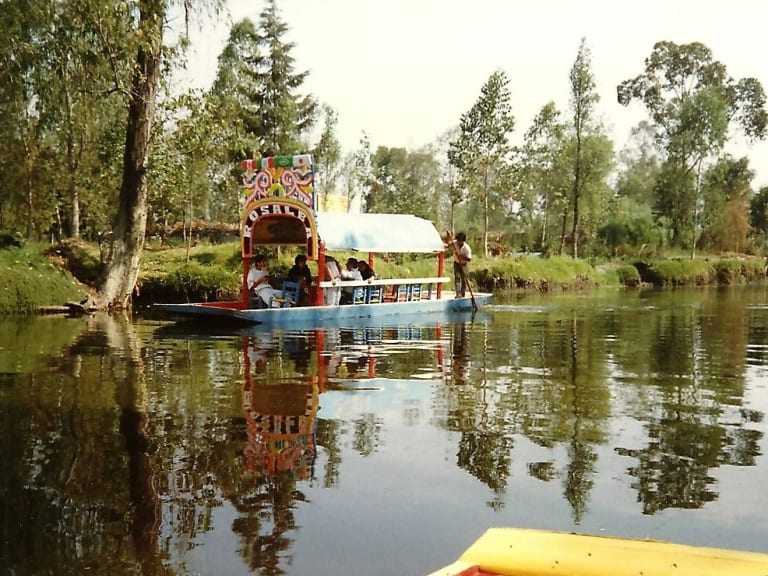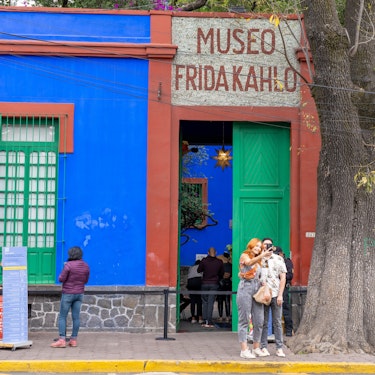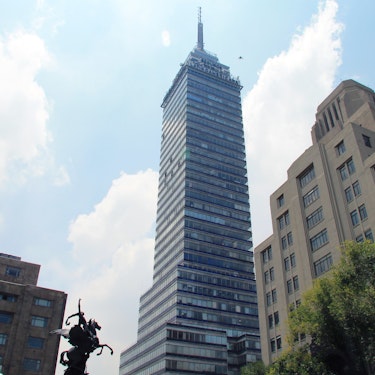More about: Best Things To Do In Mexico City In 3 Days
Mexico City is a vibrant city with a rich history and culture that was built on the ancient city of Tenochtitlan. Many ancient traditions survive, such as the celebration of the Day of the Dead, whose origins date back to pre-Hispanic times.
There are so many things to see and do in Mexico City that you could plan a week-long stay in the city. However, in 3 days you can visit its most emblematic sites, such as its historic centre, the Chapultepec Forest, the Coyoacán and Xochimilco neighbourhoods and the unmissable Pyramids of Teotihuacan, as presented in this itinerary. Let's get started!
Day 1: The Zócalo, the Alameda Central and Chapultepec Forest

On your first day in Mexico City you can tour the historic centre, starting with the Zocalo. Then you can go to the Alameda Central, where the Palacio de Bellas Artes is located, pass by the Casa de los Azulejos, and climb the Torre Latinoamericana. In the afternoon, I recommend you go and enjoy the Bosque de Chapultepec, a huge green space with history.
The Zócalo
The Zócalo is the informal name for the Plaza Constitución, the city's main square and the second largest square in the world. It was formerly a political and religious centre of Tenochtitlán, the capital of the Aztec empire, and has been a nerve centre of the city ever since.
Around this square are some of the main monuments of the CDMX, such as the Metropolitan Cathedral, one of the most important churches in South America; the Templo Mayor, a site of historical and anthropological importance that is very interesting to visit; and the National Palace, the main seat of the country's executive branch.
This tour of the city centre can be done on your own, or you can join a guided tour of Mexico City, as there are plenty of places to visit in one day, and the guides will give you all the information about each one of them.
Templo Mayor Museum
About 100 metres from the Zócalo, you will find the Templo Mayor Museum, which is made up of the ruins of sanctuaries, pyramids and other buildings that were discovered in the 19th century when the metro was being built. As it is known, Mexico City was built on the ruins of Tenochtitlan, and using the stones of its ancient buildings.
In this museum there are pieces of great historical value, such as vessels, masks, effigies, obsidian knives, the sculpture of the goddess Coyolxauhqui and the great wall called Zompantli that was made with skulls of admired old people.
- Opening hours: Tuesday to Sunday from 9 am to 5 pm.
- Entrance fee: 5 EUR per person approximately.
National Palace
Across the square is the National Palace, built by Hernán Cortés for his residence on the site of Moctezuma's palace. Today it houses government offices and is open to the public. In addition to its architectural interest, it is a Mexican must-see for its Diego Rivera murals, its central courtyard, its gardens and its two museums.
- Opening hours: Tuesday to Sunday from 9 am to 5 pm.
- Admission: free.
The Central Alameda
From the Zócalo you can walk about 900 metres to the Alameda Central, where the unmissable Palacio de Bellas Artes is located. Near the Alameda is the Diego Rivera Museum, where you can see one of his murals that was recovered from a hotel that was destroyed in an earthquake.
The Alameda Central is considered the oldest public park in Mexico, dating back to 1592 and was a marketplace in ancient Tenochtitlan. It is striking for its geometric layout, which can be seen from the air, and the large number of statues and fountains it has, as well as its grove of trees.
Without a doubt, it is a worthwhile place to fly over Mexico City in a hot air balloon, as you will be able to appreciate its entire structure, as well as enjoy other attractions of the city from a different point of view.
Palace of Fine Arts

200 metres from the Alameda Central, you will find the Palacio de Bellas Artes, one of the most emblematic buildings in Mexico City, which is interesting to see inside and out, with an incredible white marble façade.
Inside you can see one of the most renowned operas in the world, with its famous rigid curtain; 17 pieces of Mexican muralism, among them the famous "Man Controlling the Universe" by Diego Rivera, and murals by the renowned José Clemente Orozco and David Alfaro Siqueiros; as well as two museums.
- Location: Juarez Avenue S/N, Historic Centre of Mexico City.
- Opening hours: Tuesdays to Sundays from 11 am to 5 pm. Guided tours from Tuesday to Friday at 1pm and 1.30pm with limited capacity.
- Entrance fee: free.
Diego Rivera Mural Museum
200 metres from the Alameda is the Diego Rivera Mural Museum, where you can see his mural Dream of a Sunday Afternoon, which was recovered from the Hotel del Prado, after it was destroyed in an earthquake.
- Location: Balderas S/N, Colonia Centro, Centro, Cuauhtémoc, CDMX.
- Opening hours: Tuesday to Sunday from 11 am to 6 pm.
- Admission fee: 4 EUR approximately.
Palace of the Tiles
800 metres from the Metropolitan Cathedral is the Casa de los Azulejos, a palace that belonged to the Counts of the Valley of Orizaba, whose façade is covered with handmade Puebla Talavera tiles. It is truly a baroque architectural marvel.
Inside you can see a mural of the Mexican painter José Clemente Orozco, and also have lunch, as the Sanmbors Restaurant is located there, where you can try typical Mexican dishes.
- Location: Francisco I Madero s/n , Centro Histórico.
- Opening hours: every day from 7 am to 1 pm.
Latin American Tower
Less than 100 metres from the Palacio de los Azulejos, you will find the Torre Latinoamericana, one of the main viewpoints of the city. It was inaugurated in 1956 and is famous for having withstood several earthquakes. It houses the City Museum, the Bicentennial Museum and a restaurant.
You can go up to its viewpoint when you visit the Alameda, or return at sunset, after visiting the Chapultepec forest.
- Location: Balderas S/N, Colonia Centro, Centro, Cuauhtémoc, CDMX.
- Opening hours: Monday to Sunday from 9 am to 10 pm.
- Admission fee: 9 EUR approximately for adults.
Chapultepec Forest
The Bosque de Chapultepec is about 6 km from the Casa de los Azulejos. You can get there in about 40 minutes by bus or metro, or by taxi, whichever is quicker (about 10 minutes). Its history goes back some 3000 years, and it was considered a sacred place by the inhabitants of Tenochtitlán because of its water springs.
It is the largest park in America (678 hectares), so it will take you several hours to walk around it. If you are not much of a walker, I recommend that you choose which section of the park you want to see first, because you may not be able to see it all in one day. Another option is to take a bike tour around CDMX, especially through the park, as it will be faster and more entertaining.
Sections of Chapultepec Forest
These are the main attractions in each section of the Bosque:
- First Section: Anthropology Museum, Chapultepec Castle, Chapultepec Lake; Paseo de la Reforma and other museums.
- Second section: Museo Tecnológico, Museo del niño Papalote and Museo de Historia Natural.
National Museum of Anthropology and History
The National Museum of Anthropology is one of the most important museums in the world, with 26 rooms arranged chronologically and by zones. If you have a special interest in this museum, I recommend you to investigate its website and choose the rooms you are most interested in, as you won't be able to see everything in one visit.
Among the wonders you can find in this museum is the Sun Stone or Aztec Calendar. It is undoubtedly considered one of the best museums in Mexico City, so it is worth taking a guided tour to make the most of your visit.
- Location: Balderas S/N, Colonia Centro, Centro, Cuauhtémoc, CDMX.
- Opening hours: Tuesday to Sunday from 11am to 5pm.
- Admission fee: 4 EUR approximately.
Day 2: Pyramids of Teotihuacan, Basilica of Guadalupe and Tlatelolco Archaeological Ruins

On your second day in Mexico City you can leave the city to visit the Pyramids of Teotihuacan, which are only 47 km from Mexico City, so you can get there and back in one day. To get there, you can take a bus, which will take about two hours, or go by car in 45 minutes.
In the afternoon, when you return to the city, you can visit the Basilica of Guadalupe, the main religious centre of the city; and the Tlatelolco archaeological site, where the ruins of the ancient Mexica city of the same name are located.
Pyramids of Teotihuacan
Teotihuacan was an important urban centre of the ancient world, from 100 B.C. and 600 A.D./650 A.D. If you are interested in history or archaeology, or if you don't want to miss anything, you can hire a guide at the entrance, or hire a guided tour to Teotihuacan from Mexico City, with transfer included.
Touring this complex can take about 3 hours, and if you visit the museums, a few hours more. It covers about 20 square kilometres, but if you take the main street, you can easily reach the main buildings. Closing time is quite early, so it is advisable to arrive early in the morning.
What to see in Teotihuacan
It is best to enter through Gate 1, where the buses drop you off, from where you will see the citadel formed by 15 pyramids and the Calzada de los Muertos, its main avenue. This is quite wide, about 40 metres long, and will take you to the most important buildings, such as the following:
- Pyramid of the Sun: it is the most impressive construction of the complex and the largest in Mesoamerica, formed by 5 truncated cone-shaped bodies. It was considered a sacred site, a point of union of the earth and the sky.
- Pyramid of the Moon: it was built in honour of the god of storms, and it was a place from where the movements of the stars were observed.
- Pyramid of the Feathered Serpent: it is formed by seven bodies and decorated with serpents representing Cipactli (Crocodile) and the first day of the lunar calendar.
- Palace of Quetzalpapallotl: it was a priestly dwelling, with an entrance guarded by jaguars. The underground Temple of the Feathered Shells is also located there.
If you have enough time, you can also visit the Museum of Teotihuacan Culture, which contains a model of the ancient city and more than 600 pieces found in excavations at the site; and the Museum of Teotihuacan Murals, which contains recovered murals that used to decorate the buildings of Teotihuacan.
- Location: 55829 San Martin Centro, Mexico, Mexico.
- Hours: Tuesday to Sunday from 8 am to 5 pm. Last admission at 4 p.m.
- Admission fee: 5 EUR approximately.
Basilica of Guadalupe

About 40 minutes by car or 2 hours by bus from Teotihuacan is the Basilica of Guadalupe, one of the most visited churches in the world. It is an imposing circular building, whose shape alludes to the Virgin's mantle. It was built on the hill of Tepeyac where the dark-haired Virgin is said to have made her apparitions to Juan Diego.
The Virgin of Guadalupe is considered the patron saint of Mexico and a symbol of the country. The procession in her honour takes place during the month of December in Mexico City and attracts some 9 million people from all over the country and the world, making it a great experience if you visit the city at this time of year.
- Location: Balderas S/N, Colonia Centro, Centro, Cuauhtémoc, CDMFray Juan de Zumárraga No. 2, Villa Gustavo A. Madero, CDMX.
- Opening hours: Monday to Sunday from 7 am to 8 pm. Guided tours of the Basilica: Monday to Saturday at 11 am and 3 pm.
- Entrance fee: free of charge.
Tlatelolco Archaeological Ruins
Half an hour by bus or 15 minutes by car from the Basilica is the Archaeological Zone of Tlatelolco. There you can see the ruins of the ancient city of the same name, which was founded in 1338. It consists of some 27 buildings, including the Templo Mayor, which may have been higher than Tenochtitlan.
Tlatelolco, like Tenochtitlan, was one of the main cities of the pre-Hispanic world in Mexico, and one of the main commercial centres of its time.
- Location: Eje Central Lázaro Cárdenas esq. Flores Magón, Col. Nonoalco-Tlatelolco, Cuauhtémoc, Mexico City.
- Opening hours: Monday to Sunday from 8 am to 6 pm.
- Admission fee: 1 EUR approximately.
Day 3: Coyoacan Quarter and Xochimilco

On your third day in Mexico City I recommend you to visit Coyoacán, a bohemian and picturesque neighbourhood 11 km from the Zócalo. There you can visit the Casa Azul, the house where Frida Kahlo and Diego Rivera lived; the Coyoacán Market and the Parish of San Juan Bautista, founded in the early 16th century.
In the afternoon, I suggest you go to Xochimilco, where you can take a trajinera tour of its canals and visit its ecological park. And to say goodbye to the city, nothing better than a gastronomic tour of CDMX, or enjoy a traditional Mexican show.
La Casa Azul: the Frida Kahlo Museum
11 km from the Zócalo is the Casa Azul, which can be reached in 45 minutes by metro or 15 minutes by car. It is the house where Frida Kahlo lived with her family and later with Diego Rivera, which was donated by the artists to become the Frida Kahlo Museum. There you can learn more about the artist's intimate life, see her bedroom, personal items such as dresses and corsets, or the first self-portrait she painted.
It's a very busy museum, so it's best to buy your ticket in advance.
- Location: Londres 247, Col. Del Carmen, Coyoacán, 04100, CDMX.
- Opening hours: Tuesday to Sunday from 10 am to 6 pm, except Wednesday when it opens at 11 am. Closed on Mondays. Holidays from 10 a.m. to 2 p.m.
- Admission fee: 5 EUR approximately.
Coyoacán Market
500 metres from the Casa Azul is this lively market with the best of Mexican cuisine. The custom is to put one of the many stews offered on a tostada, whose ingredients can be seafood, mushrooms, vegetables or tinga (made with shredded meat) and some sauce. It is perfect for lunch.
Besides, in the Coyoacán market you can buy typical sweets, handicrafts, antiques, costumes, fruits, vegetables and more. It is one of the places you cannot miss on a gastronomic tour of Mexico City.
- Location: Ignacio Allende s/n, Del Carmen, Coyoacán, CDMX.
- Opening hours: Monday to Friday from 11 am to 8 pm, and Saturdays and Sundays from 11 am to 10 pm.
San Juan Bautista Parish Church
500 metres from the Coyoacán market, just past Plaza Hidalgo, is the Parroquia de San Juan Bautista, a 16th century church in the Baroque style. It is one of the oldest in the city, and has a large collection of artwork from the colonial period. The Plaza Hidalgo was also part of the church, and its garden is now the Parque de Coyoacán.
- Location: Centenario 8, Villa de Coyoacán, Coyoacán, CDMX.
Xochimilco
This neighbourhood is a bit far from Coyoacán, about 11 km away, but it really is a must-see during your visit to Mexico City, as Xochimilco and Coyoacán are undoubtedly some of the best neighbourhoods in the CDMX. Public transport takes about an hour and a half, but a taxi or car will get you there in about 20 minutes.
In Xochimilco, which is in the south of the city, there are a series of islets and canals that were created by the Aztecs as part of an extensive transport system. There you can hop on the trajineras, adorned with an arch with flowers, and take a fun ride, listening to mariachis and tasting typical food. There are some 184 km of canals to explore.
In addition to the traditional tour, you can take a trajinera ride through the Xochimilco Ecological Park, a protected wetland area, so the tour is more peaceful and contemplative, so you can appreciate the richness of the flora and fauna of the place.
This is the itinerary I propose to get to know Mexico City in 3 days, with the most emblematic sites of the city and its surroundings. In the evenings you can go to a Ballet Folklorico de Mexico show, or to a wrestling and mariachi show, two very traditional shows for Mexicans, before saying goodbye to this incredible city.



